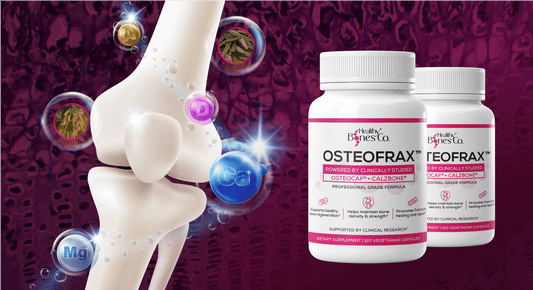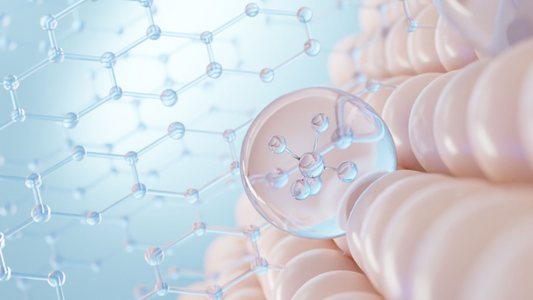When you hear testosterone, you probably think of muscles or libido.
However, this powerhouse hormone does more than boost performance—it also helps keep your bones healthy and strong as you age.
In fact, research has consistently shown that men with healthy testosterone levels tend to have higher bone mineral density (BMD), which lowers their risk of fractures as they age. (1)
In contrast, men with low testosterone levels experience a significant decline in bone mineral density (BMD), increasing their likelihood of bone loss by up to 12.3% and raising their fracture risk by 1.5 to 2 times compared to men with healthy testosterone levels. (2) (3)
So, how does testosterone support bone health in men, and what role does low testosterone play in reduced bone mineral density (BMD) and a higher risk of fractures?
The Role of Testosterone in Men’s Bone Health
Testosterone doesn’t just fire up your libido—it also plays a big role in keeping your bones strong and healthy as you age, in several important ways.
Regulates Bone Breakdown by Supporting Osteoclasts

Testosterone supports strong and healthy bones in men by regulating the process of bone remodeling.
It does this, in part, by supporting osteoclasts—the specialized cells responsible for breaking down old or damaged bone tissue. (4)
While this might sound counterintuitive, this bone breakdown is essential for overall bone health.
Osteoclasts clear out old bone so that osteoblasts, the bone-building cells, can replace it with new, stronger tissue. (5)
Testosterone ensures that this breakdown process remains balanced, preventing excessive bone loss that could weaken the skeleton. (6)
However, a deficiency in testosterone can disrupt the delicate balance between bone formation and bone breakdown, increasing the risk of weakened bones and fractures, especially in aging men.
Here’s what happens on a cellular level: when testosterone levels drop, it triggers osteoblast precursors—the cells that build bone—to produce too much RANKL (receptor activator of nuclear factor kappa-B ligand). (7)
This excess RANKL then activates osteoclasts, the cells responsible for breaking down bone. The result is an imbalance that leads to more bone loss than bone building, which can weaken your bones over time. (8)
The good news?
Maintaining healthy testosterone levels can naturally help protect your bones.
This hormone acts as a natural "brake" for osteoclast activity, slowing down the bone breakdown caused by RANKL and other triggers, keeping your bones strong and healthy.
In fact, a study published in the Journal of Bone and Mineral Research reported that testosterone influences bone resorption by targeting osteoclasts—the cells responsible for breaking down bone. (9)
In a controlled study, human peripheral blood CD14(+) osteoclast precursors were cultured with factors like RANKL, macrophage colony-stimulating factor (M-CSF), TNF-alpha, and dexamethasone to stimulate osteoclast differentiation.
Testosterone was then added in various doses to evaluate its effects.
The findings showed that testosterone suppressed osteoclast formation and activity in a dose-dependent manner, even in the absence of osteoblasts.
Therefore, if you want to support a healthy bone remodeling process, it’s essential to maintain optimal testosterone levels.
Promotes Bone Formation Through Osteoblast Stimulation

Testosterone supports bone health primarily by promoting bone formation and inhibiting bone resorption.
It works directly on osteoblasts by binding to androgen receptors (AR) found in these cells. When testosterone levels drop, the activation of these receptors diminishes, which in turn slows down the proliferation and function of osteoblasts. (10)
As a result, bone mass shrinks and the structure weakens. It’s especially noticeable in trabecular bone, which is important in bone strength and integrity. (11)
Testosterone also helps regulate growth factors like insulin-like growth factor-1 (IGF-1) and transforming growth factor-beta (TGF-β), both of which are crucial for osteoblast function. (12)
When testosterone is low, the body doesn’t produce as much IGF-1 and TGF-β, which are important for stimulating osteoblasts, the cells that build bone. This slowdown in osteoblast activity leads to more bone loss over time.
This has been supported by a study published in The Journal of Clinical Endocrinology & Metabolism, where researchers looked at how declining testosterone and IGF-I (insulin-like growth factor I) levels contribute to bone loss in men. (13)
The researchers examined data from 61 men, measuring their IGF-I, testosterone, bone health markers, and bone mineral density (BMD) at the spine and hip.
Researchers found that as men age, both IGF-I and testosterone levels decline, while parathyroid hormone (PTH) levels rise. PTH contributes to bone loss by boosting osteoclast activity, which breaks down bone tissue.
IGF-I showed a strong link to bone mineral density (BMD) at various hip sites, while testosterone and the free androgen index (FAI) were associated with BMD in the lumbar spine and other regions.
Additionally, sex hormone-binding globulin (SHBG) also influenced BMD at certain hip sites.
In other words, the decline in both testosterone and IGF-I influences bone loss as men age, and maintaining healthy levels of these hormones is important for supporting bone health.
Influences Inflammation and Bone Health

Testosterone not only supports healthy bone mineral density (BMD) but also helps manage inflammation, which can negatively affect bone health and strength.
One of the ways it does this is by regulating the production of pro-inflammatory cytokines, which can have a damaging effect on bone health. (14)
For example, testosterone helps lower the production of tumor necrosis factor-alpha (TNFα) and interleukin-6 (IL-6)—cytokines that trigger osteoclast activity—helping maintain a balanced process between bone formation and breakdown, promoting healthier bones. (15)
In fact, a study published in the Journal of Bone and Mineral Research revealed how inflammation might contribute to fractures in older men. (16)
Researchers followed 961 men, including those with vertebral, hip, and non-spine fractures, for an average of about 6 years. The researchers measured key inflammatory markers like TNFα, IL-6, CRP, and IL-10 to see how they affected bone health.
The results showed that men with the highest levels of TNFα and its receptors had a 2- to 4-times higher risk of hip and vertebral fractures compared to those with the lowest levels.
Even for non-spine fractures, the risk was elevated, although not as dramatically.
On the other hand, men with high levels of IL-10, an anti-inflammatory marker, had a 49% lower risk of vertebral fractures compared to those with lower levels.
The most surprising part?
Men with three or more inflammatory markers in the highest quartile were at nearly double the risk of hip fractures and more than triple the risk of vertebral fractures.
While factors like lean mass and bone density helped explain some of the increased risk, inflammation still played a huge role.
Therefore, managing inflammation—especially by maintaining healthy testosterone levels—could help prevent fractures and support bone health as men get older.
Works with Estrogen to Strengthen Bones

Testosterone often gets the spotlight when it comes to men’s bone health, but estrogen plays just as important a role.
Estradiol, a type of estrogen, helps support bone mineral density (BMD) and prevents excessive bone loss, which can increase the risk of fractures, especially as men get older. (17)
When estrogen levels drop, it can speed up bone turnover, making bones more fragile and susceptible to damage.
This can lead to faster bone loss and slower bone maturation, weakening the overall bone structure.
The good news is that men can boost their estrogen levels by converting testosterone into estradiol with the help of an enzyme called aromatase. (18)
However, if testosterone levels are low, this conversion process doesn’t work as well, which leads to lower estrogen levels and weaker bones.
A study published in Calcified Tissue International revealed how maintaining healthy estrogen levels, alongside testosterone, supports bone health in older men. (19)
Researchers studied 59 men averaging 68 years old and examined the effects of testosterone and estrogen on bone health.
They first removed the men’s natural testosterone and estrogen and replaced them with physiological doses of both hormones. Then, they tested the impact of withdrawing either testosterone, estrogen, or both.
They discovered that estrogen was the primary hormone responsible for regulating bone breakdown (resorption), while both estrogen and testosterone were essential for promoting bone formation.
Therefore, it’s important to maintain healthy testosterone levels, not only to support bone health directly but also to help maintain the estrogen levels required for strong, resilient bones.
How to Support Healthy Testosterone Levels and Strong Bones
Supporting healthy testosterone levels and maintaining strong bones requires a well-rounded approach that includes taking lifestyle habits, dietary choices, and supplements into account. Here’s how you can do it.
Regular Exercise

Staying active is one of the most effective ways to boost testosterone and promote bone health.
Strength training, in particular, not only increases testosterone levels temporarily after workouts but can also lead to sustained improvements over time. (20)
When you challenge your muscles and bones with resistance training, it helps stimulate testosterone production and improve bone density.
Compound movements like squats, deadlifts, and bench presses are especially powerful since they engage multiple muscle groups and have the biggest impact on your hormone levels.
Adding weight-bearing activities like running or hiking can also benefit bone strength by promoting bone remodeling. (21)
However, before starting any exercise program, remember to consult with the BoneCoach Team to help you figure out the best workouts for boosting testosterone, strengthening your bones, and reducing your fracture risk. (22)
Eat a Well Balanced Diet

A balanced diet is crucial for maintaining both strong bones and healthy testosterone levels as you age.
Calcium-rich foods like arugula, bok choy, kale, and broccoli are essential for bone health.
These vegetables help form compounds such as calcium phosphate and calcium carbonate, which give bones their strength and density, reducing the risk of fractures and supporting bone resilience. (23)
Vitamin D, which you can obtain from sources like fatty fish, egg yolks, and mushrooms, is equally important. Not only does vitamin D enhance calcium absorption, making it essential for bone health, but it also supports testosterone production.
A study in Hormone and Metabolic Research shows that men with optimal vitamin D levels tend to have better hormonal health and maintain higher testosterone levels. (24)
The trial involved 165 overweight men undergoing a weight reduction program. Participants were given either 83 μg (3,332 IU) of vitamin D daily or a placebo for one year.
Initially, both groups had low vitamin D levels and testosterone at the lower end of the normal range.
After one year, the vitamin D group had an increase in vitamin D levels and a corresponding increase in total, bioactive, and free testosterone. Meanwhile, the placebo group showed no significant change in testosterone.
The results suggest that vitamin D supplementation may boost testosterone levels, although further studies are needed to confirm this.
Moreover, vitamin C, abundant in citrus fruits, bell peppers, kale, and Brussels sprouts, is a potent antioxidant that protects Leydig cells in the testes from the damaging effects of oxidative stress. (25)
It also supports the production of luteinizing hormone (LH), which signals the testes to produce testosterone, further promoting healthy hormone levels.
By including calcium, vitamin D, and vitamin C-rich foods in your diet, you can support both strong bones and healthy testosterone levels, helping you stay active, strong, and healthy as you age.
Get Quality Sleep

Sleep is more than just rest—it's when your body enters important restorative phases that support hormone production, including testosterone. (26) (27)
Without enough sleep, your body struggles to produce testosterone and other vital hormones needed for maintaining healthy bones and optimal health.
For instance, a study in JAMA revealed that insufficient sleep, especially when it's limited to just 5 hours per night, can cause testosterone levels to drop by as much as 15%. (28)
This decline can negatively impact bone health, as low testosterone is associated with reduced bone mineral density and a higher risk of fractures.
To support both bone health and testosterone levels, aim for 7-8 hours of deep sleep at night to promote restorative sleep. This will help your body work efficiently to support your bones, muscles, and overall health.
Limit Alcohol Consumption
Excessive alcohol consumption directly reduces testosterone production, which affects osteoblasts—the cells responsible for bone formation. As testosterone levels drop, bone density can decrease, making you more susceptible to bone loss and fractures. (29)
But the effects don’t stop there. Alcohol also disrupts the absorption of vital nutrients like calcium and vitamin D, both of which are essential for bone health. (30)
Vitamin D helps your body absorb calcium, and alcohol interferes with the liver’s ability to activate vitamin D properly. Without the right amount of calcium being absorbed, your bones become weaker and more prone to damage.
In short, heavy drinking not only lowers your testosterone levels but also hinders the absorption of nutrients necessary for strong bones.
Therefore, moderating alcohol intake, or even avoiding it altogether, can support healthy testosterone levels and maintain strong bones over time.
Take Annatrol™ Bone Support

If you’re looking to support your bone health as you age, try Annatrol™ Bone Support by Healthy Bones Co.
Annatrol™ Bone Support combines Annatto tocotrienols and geranylgeraniol (GG), two powerful nutrients that support bone health and strength as you age.
Each serving of Annatrol™ contains 300 mg of pure Annatto tocotrienols, a potent form of vitamin E that works to combat oxidative stress, a common issue that often comes with aging.
By neutralizing free radicals, Annatto tocotrienols protect your bone tissue, promoting stronger, healthier bones as you age.
Not only can this help reduce bone breakdown and encourage bone formation in postmenopausal women, but Annatto tocotrienols can also support bone density by promoting healthier bone remodeling in men. (31)
It helps counteract the bone remodeling imbalance caused by testosterone deficiency, which typically leads to increased osteoclast (bone resorption) activity and decreased osteoblast (bone formation) activity. (32)
Moreover, researchers from Universiti Kebangsaan Malaysia discovered that Annatto tocotrienol is effective in improving bone health markers and is comparable to testosterone enanthate (a standard testosterone therapy). (33)
This suggests that tocotrienols could be a potential alternative or complement to traditional testosterone replacement therapies.
Annatrol™ Bone Support also contains 300 mg of geranylgeraniol (GG), a compound that supports protein synthesis, muscle health, hormone regulation, and the production of CoQ10 and MK-4 in the body.
MK-4 helps activate osteocalcin, a protein that binds calcium to the bone matrix. This process helps improve calcium utilization and strengthens bone density. (34)
Moreover, geranylgeraniol supports healthy testosterone levels, especially in men with low testosterone.
A clinical trial conducted by the Applied Science and Performance Institute found that GG supplementation can increase total, free, and bioavailable testosterone levels in men with low testosterone. (35)
In fact, participants who took GG saw increases of 7.5%, 15%, and 14.8%, respectively, in these testosterone metrics, compared to the placebo group, which experienced a decline in testosterone levels.
This suggests that GG can effectively boost testosterone in men with hormonal deficiencies.
In other words, Annatrol™ Bone Support is a powerful supplement that supports healthy testosterone levels and promotes healthy bones for a strong and active future.
Beyond the bone health benefits, just two pea-sized capsules of Annatrol™ Bone Support can also…
- Help maintain skin and eye health*
- Promote cardiovascular and circulatory health*
- Promote regulation of healthy metabolic functions*
- Support insulin sensitivity and normal glycemic control*
- Promote a healthy inflammatory response*
- Support antioxidant status*
- Maintain healthy liver function*
- Help mitochondrial function and cellular energy generation*
- Support hormone synthesis*
- Support proper cell membrane construction*
- Provide support for healthy lipid profile and total cholesterol levels*
Support healthy and strong bones regardless of your gender.
Try Annatrol™ Bone Support today.





